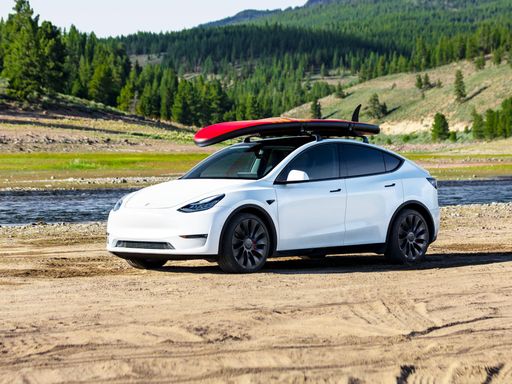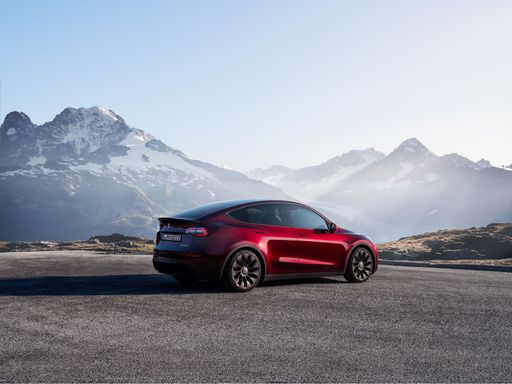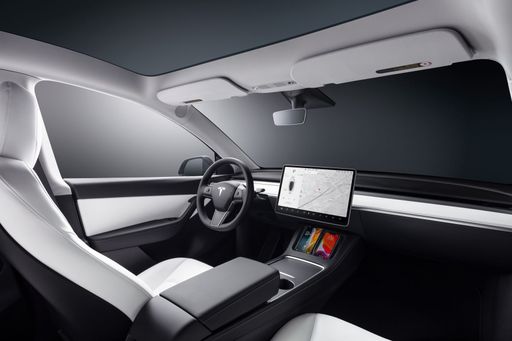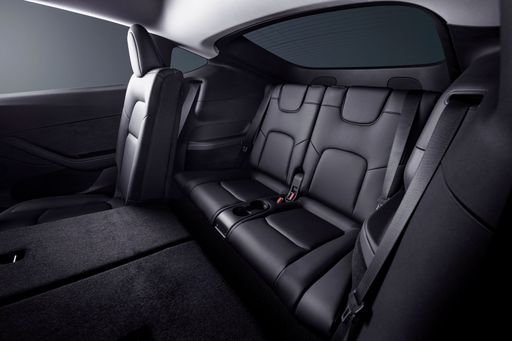VW Tiguan vs Tesla Model Y – Differences & prices compared
Compare performance, boot space, consumption and price in one view.
Find out now: which car is the better choice for you – VW Tiguan or Tesla Model Y?
The VW Tiguan (SUV) comes with a Plugin Hybrid, Petrol, Petrol MHEV or Diesel engine and Automatic transmission. In comparison, the Tesla Model Y (SUV) features a Electric engine with Automatic transmission.
When it comes to boot capacity, the VW Tiguan offers 652 L, while the Tesla Model Y provides 0 L – depending on how much space you need. If you’re looking for more power, decide whether the 272 HP of the VW Tiguan or the 514 HP of the Tesla Model Y suits your needs better.
In terms of consumption, the values are 0.40 L per 100 km for the VW Tiguan, and 13.90 kWh for the Tesla Model Y.
Price-wise, the VW Tiguan starts at 32800 £, while the Tesla Model Y is available from 38600 £. Compare all the details and find out which model fits your lifestyle best!
When it comes to comparing the VW Tiguan to the Tesla Model Y, both vehicles offer unique advantages tailored to different automotive needs. The Tiguan shines with its robust build quality, spacious interior, and practical fuel efficiency, making it a reliable choice for families looking for a conventional SUV experience. On the other hand, the Model Y stands out with its cutting-edge electric performance, innovative technology, and eco-friendly design, appealing to tech-savvy consumers seeking a sustainable and futuristic ride.
VW Tiguan
The VW Tiguan presents itself as a versatile and practical option in the SUV market, combining a stylish design with a spacious and comfortable interior. It offers a smooth driving experience, making it well-suited for both urban environments and longer journeys. With its focus on safety and innovative technology features, the Tiguan remains a compelling choice for families and adventurers alike.
details @ Volkswagen
@ Volkswagen
 @ Volkswagen
@ Volkswagen
 @ Volkswagen
@ Volkswagen
 @ Volkswagen
@ Volkswagen
 @ Volkswagen
@ Volkswagen
 @ Volkswagen
@ Volkswagen
Tesla Model Y
The Tesla Model Y stands out in the electric vehicle market with its sleek design and impressive range. Its interior is minimalist yet stylish, offering a spacious cabin that enhances the driving experience. The Model Y also features advanced technology, including an intuitive infotainment system, making it a leader in innovative motoring.
details @ tesla.com
@ tesla.com
 @ tesla.com
@ tesla.com
 @ tesla.com
@ tesla.com
 @ tesla.com
@ tesla.com
Introducing the Contenders: VW Tiguan vs Tesla Model Y
The automotive marketplace is bustling with numerous SUVs, but two models frequently stand out for comparison—the VW Tiguan and Tesla Model Y. Both cater to enthusiastic SUV aficionados and differ substantially in their technical aspects and innovations. Whether you're a fan of traditional engines or innovative electric technology, this comparison will guide you through the decision-making process.
Engine and Performance
The VW Tiguan enters the arena with a diverse range of engine options, including Petrol MHEV, Plugin Hybrid, Diesel, and Petrol configurations, suitable for varied driving preferences. With power output ranging from 130 to 272 HP, the Tiguan offers a flexible blend of performance and efficiency. Coupled with dual-clutch automatic transmission, it caters to drivers who appreciate smooth gear shifts and responsive driving dynamics. It also offers a top speed of up to 242 km/h.
On the other hand, the Tesla Model Y offers cutting-edge electric powertrains with power outputs between 299 and 534 HP. It boasts instantaneous torque, allowing acceleration from 0 to 100 km/h in a breathtaking 3.7 seconds in some models. With a maximum speed of 250 km/h, the Model Y proves that electric SUVs can offer thrilling performance alongside zero-emissions driving.
Range and Efficiency
Although the VW Tiguan presents robust fuel efficiency, the spotlight shines on the Tesla Model Y when it comes to electric range. The Model Y delivers a range of up to 600 km on a single charge, thanks to its larger battery capacity (up to 79 kWh). Conversely, the Tiguan's Plugin Hybrid offers an electric range of up to 113 km, ideal for short urban journeys.
Efficiency-wise, the Model Y stands out with an energy consumption of around 15.7 to 17.3 kWh/100 km, demonstrating Tesla’s prowess in optimizing electric energy usage. Meanwhile, Tiguan's consumption ranges from 5.3 to 8.5 L/100 km, influenced by its fuel type and driving conditions.
Interior and Space
A key deciding factor for many SUV buyers is interior space and cargo capacity. The Tiguan provides a trunk capacity of up to 652 liters, accommodating families' needs for space and practicality. Its design ensures passenger comfort for all five occupants, with ample legroom and advanced infotainment systems enhancing the driving experience.
The Model Y advances on the storage front with up to 854 liters of trunk space, exploiting Tesla's design of a front and rear cargo area. Available in 5 or 7-seat configurations, it can cater to larger families or those requiring additional passenger space, coupled with Tesla's iconic minimalist and tech-laden interiors.
Innovations and Technology
The VW Tiguan impresses with its latest technology in traditional automotive engineering, featuring mild hybrid and plug-in hybrid innovations that improve fuel efficiency and reduce emissions. Drivers benefit from VW's reliable tech features, focusing on connectivity and safety.
Tesla, however, continues to lead in automotive technology. The Model Y integrates seamless software updates, Autopilot capabilities, and a center-mounted touchscreen that controls almost all vehicle functions. It reflects Tesla's philosophy of integrating cutting-edge technology to deliver a futuristic driving experience.
Conclusion: Tradition vs Innovation
Choosing between the VW Tiguan and Tesla Model Y ultimately comes down to traditional versus modern preferences. The Tiguan offers a variety of conventional powertrains with hybrid options, appealing to loyalists of the combustion engine. The Model Y caters to tech-savvy drivers desiring electric efficiency and technological advancements.
Both vehicles signify excellence in their categories, making the choice a matter of personal preference, lifestyle needs, and vision for the future of driving.

|

|
|
|
|
Costs and Consumption |
|
|---|---|
|
Price
32800 - 51000 £
|
Price
38600 - 45400 £
|
|
Consumption L/100km
0.4 - 8.5 L
|
Consumption L/100km
-
|
|
Consumption kWh/100km
-
|
Consumption kWh/100km
13.9 - 15.3 kWh
|
|
Electric Range
119 - 129 km
|
Electric Range
500 - 622 km
|
|
Battery Capacity
19.70 kWh
|
Battery Capacity
62.5 - 78.4 kWh
|
|
co2
8 - 193 g/km
|
co2
0 g/km
|
|
Fuel tank capacity
45 - 58 L
|
Fuel tank capacity
-
|
Dimensions and Body |
|
|---|---|
|
Body Type
SUV
|
Body Type
SUV
|
|
Seats
5
|
Seats
5
|
|
Doors
5
|
Doors
5
|
|
Curb weight
1599 - 1890 kg
|
Curb weight
1976 - 2072 kg
|
|
Trunk capacity
490 - 652 L
|
Trunk capacity
0 L
|
|
Length
4539 mm
|
Length
4790 mm
|
|
Width
1842 - 1859 mm
|
Width
1921 mm
|
|
Height
1656 - 1658 mm
|
Height
1624 mm
|
|
Payload
460 - 533 kg
|
Payload
-
|
Engine and Performance |
|
|---|---|
|
Engine Type
Plugin Hybrid, Petrol, Petrol MHEV, Diesel
|
Engine Type
Electric
|
|
Transmission
Automatic
|
Transmission
Automatic
|
|
Transmission Detail
Dual-Clutch Automatic
|
Transmission Detail
-
|
|
Drive Type
Front-Wheel Drive, All-Wheel Drive
|
Drive Type
Rear-Wheel Drive, All-Wheel Drive
|
|
Power HP
130 - 272 HP
|
Power HP
299 - 514 HP
|
|
Acceleration 0-100km/h
5.9 - 10.6 s
|
Acceleration 0-100km/h
4.8 - 5.9 s
|
|
Max Speed
198 - 242 km/h
|
Max Speed
201 km/h
|
|
Torque
220 - 400 Nm
|
Torque
420 - 493 Nm
|
|
Number of Cylinders
4
|
Number of Cylinders
-
|
|
Power kW
96 - 200 kW
|
Power kW
220 - 378 kW
|
|
Engine capacity
1498 - 1984 cm3
|
Engine capacity
-
|
General |
|
|---|---|
|
Model Year
2024 - 2025
|
Model Year
2025
|
|
CO2 Efficiency Class
B, G, D, E, F
|
CO2 Efficiency Class
A
|
|
Brand
VW
|
Brand
Tesla
|
VW Tiguan
Introducing the VW Tiguan: A Blend of Style and Innovation
The VW Tiguan has consistently been a popular choice among SUV enthusiasts, combining practicality with a touch of elegance. In the latest iteration, Volkswagen has continued this tradition with a range of technical updates and innovations.
Powertrains: Versatility Meets Efficiency
The VW Tiguan comes with a variety of engine options, catering to different preferences and needs. From the efficient petrol mild-hybrid variants to the environmentally friendly plug-in hybrids, and the robust diesel engines, there is something for everyone. The power output ranges from a modest 130 PS to an impressive 272 PS, ensuring that drivers can enjoy a powerful and dynamic driving experience.
Innovation remains at the heart of the Tiguan’s engineering. The plug-in hybrid models, for example, boast an electric range of up to 113 km, making them ideal for those looking to reduce their carbon footprint while still enjoying the flexibility of a traditional engine.
Advanced Transmission and Drivetrain
Equipped with a smooth and responsive automatic transmission, the Tiguan ensures a comfortable drive. The dual-clutch gearbox provides quick and seamless gear changes, enhancing the driving experience. Additionally, the Tiguan is available in both front-wheel and all-wheel drive configurations, offering excellent traction and stability across different driving conditions.
Performance and Efficiency
The Tiguan's performance capabilities are complemented by its efficiency. With fuel consumption as low as 0.4 L/100km for hybrid models, owners can enjoy long trips with fewer stops for refuelling. The CO2 emissions are also impressively low, aligning with modern environmental standards and expectations.
Design and Dimensions
The Tiguan’s aesthetic appeal is undeniable, with a robust character that exudes confidence and sophistication. Its dimensions—4,539mm in length, 1,842 to 1,859 mm in width, and up to 1,658mm in height—provide ample interior space, making it a versatile vehicle for families and adventure seekers alike.
Practicality is further emphasised by its sizeable boot space, ranging from 490 to 652 litres, ensuring plenty of room for luggage or shopping.
Safety and Technology
Volkswagen has not compromised on safety or technology. The Tiguan is equipped with the latest driver assistance systems, ensuring a safe journey for its occupants. Features like adaptive cruise control, lane assist, and emergency braking provide an extra layer of protection.
Pricing and Value
Starting from €38,250 to €59,535, the Tiguan offers a range of specifications and features to match different budgets. When considering the advanced technology, engine options, and the premium feel of the cabin, it presents excellent value for money.
Conclusion: The Ultimate SUV Experience
The VW Tiguan continues to impress with its blend of innovative technology, performance, and practicality. Whether you’re looking for an eco-friendly hybrid with a long electric range or a powerful diesel for longer hauls, the Tiguan provides an all-encompassing solution. With its refined design and superior comfort, it remains a leading choice in the SUV segment.
Tesla Model Y
Revolutionising the SUV Market: Introducing the Tesla Model Y
The Tesla Model Y has emerged as a trailblazer in the electric vehicle market, combining innovative technology with practicality to redefine what an SUV can offer. With its sleek design and exceptional performance, it's no surprise that this model is capturing the attention of car enthusiasts and eco-conscious drivers alike.
Unparalleled Performance and Efficiency
At the heart of the Tesla Model Y lies its impressive range of power and efficiency options. With power ratings from 299 to 534 PS, the Model Y offers something for every driver. It boasts an impressive electric range from 455 to 600 km, allowing drivers to embark on long journeys with confidence.
An advanced lithium-ion battery, with capacities ranging from 62 to 79 kWh, powers this remarkable vehicle. This ensures not only a robust performance but also efficiency, with consumption figures between 14.9 kWh and 17.3 kWh per 100 km, making it a leader in its class.
Advanced Technology and Safety
Tesla is renowned for its technology-forward approach, and the Model Y is no exception. It features the state-of-the-art Autopilot system, designed to assist with driving and to enhance safety on the road. This includes features such as adaptive cruise control, lane detection, and automatic lane-keeping, which work seamlessly to reduce driver fatigue and improve overall road safety.
The Model Y has achieved a superb CO2-Effizienzklasse rating of A, reflecting its zero-emissions performance, thanks to its fully electric powertrain. This aligns perfectly with Tesla's mission of accelerating the world’s transition to sustainable energy.
Design and Comfort
One glance at the Tesla Model Y, and it is clear that it combines utility with elegance. This SUV offers ample space, marked by a large interior and a boot capacity of 854 litres, making it an ideal vehicle for both family and leisure activities. However, the Model Y does not sacrifice aesthetics for practicality, embodying a minimalist and aerodynamic design that stands out on any road.
Inside, the focus is on comfort and connectivity. The Model Y features a panoramic glass roof, spacious seating for five, and a central 15-inch touchscreen that controls most in-car functions. This screen serves as the central hub for navigation, media, and communication systems, further highlighting Tesla's commitment to integrating sophisticated technology.
Final Thoughts: A Game-Changer in Electric SUVs
The Tesla Model Y is more than just an electric vehicle; it is a testament to what the future of driving looks like. From its performance capabilities to its innovative technology and design, the Model Y continues to set benchmarks in the automotive industry.
For those looking to combine sustainability with performance, the Model Y offers such an opportunity in an attractive package. It is not just a vehicle; it's a statement of forward-thinking mobility and advanced engineering, paving the way for the next era of automotive excellence.
Which drive types are available for the VW Tiguan?
Available as Front-Wheel Drive or All-Wheel Drive.
The prices and data displayed are estimates based on German list prices and may vary by country. This information is not legally binding.
